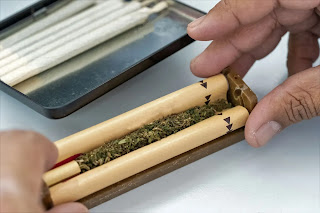THCA vs. THC: Unlocking the Cannabinoid Code
The world of cannabis is constantly evolving, and with it, our understanding of its complex chemical makeup. While THC (tetrahydrocannabinol) has long been the star of the show, a new contender, THCA (tetrahydrocannabinolic acid), is gaining traction. But what exactly is the difference between these two cannabinoids, and why does it matter? Let's break it down.
THC: The Psychoactive Powerhouse
THC is the cannabinoid responsible for the "high" associated with cannabis use. It interacts with the CB1 receptors in the brain, leading to altered perception, euphoria, and relaxation. However, THC can also cause anxiety or paranoia in some individuals.
- Psychoactive: Yes, it gets you high.
- Formation: Produced when THCA is heated (decarboxylation).
- Effects: Euphoria, relaxation, altered perception, potential anxiety.
- Legality: Varies by jurisdiction, often restricted.
THCA: The Non-Psychoactive Precursor
Pulsar Double Trouble Dry Pipe & Dab Rig
THCA is the acidic precursor to THC. It's abundant in raw and unheated cannabis. Unlike THC, THCA does not bind effectively to CB1 receptors, meaning it won't produce psychoactive effects.
- Psychoactive: No, it does not get you high.
- Formation: Naturally occurring in raw cannabis.
- Effects: Potential anti-inflammatory, neuroprotective, and antiemetic properties (research ongoing).
- Legality: Generally considered legal as it's not psychoactive, but this can vary depending on local laws.
The Decarboxylation Difference
The key difference between THCA and THC lies in a process called decarboxylation. This is where heat is applied to THCA, removing a carboxyl group and converting it into psychoactive THC.
 |
| Hemper Pineapple Rig |
- How it happens:
- Smoking or vaping cannabis.
- Baking or cooking cannabis.
- Heating cannabis for extraction.
When you smoke or vape cannabis, the heat instantly decarboxylates the THCA, releasing THC that can be absorbed by the body. If you consume raw cannabis, such as in a juice or smoothie, you'll primarily be ingesting THCA.
Potential Benefits of THCA
While research is still in its early stages, THCA shows promise for various therapeutic applications:
- Anti-inflammatory: Studies suggest THCA may have anti-inflammatory properties.
- Neuroprotective: Research indicates potential neuroprotective effects, which could be beneficial for neurological conditions.
- Antiemetic: THCA may help reduce nausea and vomiting.
- Anticancer: Some research is exploring THCA's potential in inhibiting cancer cell growth.
It's important to note that more research is needed to fully understand the potential benefits of THCA.
 |
| Crush Shovel Head Hand Pipe |
In Summary:
- THCA is the non-psychoactive precursor to THC.
- Decarboxylation (heating) converts THCA to psychoactive THC.
- THC produces the "high" associated with cannabis.
- THCA may offer various therapeutic benefits without psychoactive effects.
- Always check your local laws regarding cannabis and its related compounds.
As our understanding of cannabinoids continues to grow, we're uncovering the complex interactions and potential benefits of compounds like THCA. While THC remains a prominent figure in the cannabis world, THCA is carving out its own niche, offering a non-psychoactive alternative with potential therapeutic value.
 |
| Honeybee Herb Cyclone Vortex Carb Cap |



.webp)


.webp)




.jpg)
.jpg)
Comments
Post a Comment